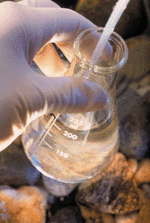ISSUE 46: JUNE-AUGUST 2007
network of research and training centres/programmes
FRONT PAGE | ARCHIVE |
UNU-Shimadzu project recognised as POPs monitor
An 11-year UNU-private sector partnership project with Shimadzu Corporation – Environmental Monitoring and Governance in the Asian Coastal Hydrosphere – has been recognised as a Persistent Organic Pollutants (POPs) monitoring activity under the Stockholm Convention.
 |
At the third meeting of the Conference of the Parties of the Stockholm Convention (COP3), held in Dakar, Senegal, April 30-May 4, UNU representative Dr. Fukuya Iino introduced the project as an example of how private sector resources can be leveraged in monitoring POPs.
The COP3 document, Updated information on existing human health and environment monitoring programmes, provides an inventory of existing national and international/regional POPs monitoring projects and reveals that many countries, particularly in Africa, Pacific Islands, South Asia, Central America and the Caribbean, have little or no POPs monitoring capacity.
UN Environment Programme recommends air and human breast milk samples as priority targets to detect long-term POPs trends. The UNU-Shimadzu project does not analyse these samples but its monitoring of biological samples and water data in Asia could provide supporting information on the effectiveness of the Stockholm Convention at COP4 in 2009.
The UNEP inventory of existing monitoring activities identified the UNU project as one of the existing POPs monitoring activities for eight participating countries – China, Indonesia, Republic of Korea, Philippines, Malaysia, Singapore, Thailand and Viet Nam. Results will be presented at the Dioxin 2007 conference in Tokyo September 2-7. UNU will be one of the sponsors of the conference.
© 2007 United Nations University